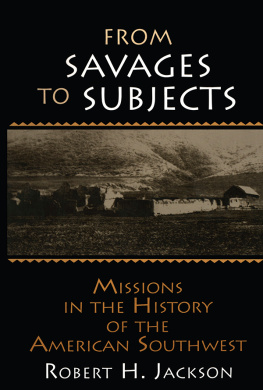FROM
SAVAGES
TO SUBJECTS
Latin American Realities
Robert M. Levine, Series Editor
AFRO-BRAZILIAN CULTURE AND POLITICS
Bahia, 1790s-1990s
Hendrik Kraay, Editor
BITITAS DIARY
Childhood Memoirs of Carolina Maria de Jesus
Carolina Maria de Jesus, Author
Robert M. Levine, Editor Emanuelle Oliveira and Beth Joan Vinkler, Translators
FIGHTING SLAVERY IN THE CARIBBEAN
The Life and Times of a British Family in Nineteenth-Century Havana
Luis Martinez-Fernndez
FROM SAVAGES TO SUBJECTS
Missions in the History of the American Southwest
Robert H. Jackson
MAYA REVOLT AND REVOLUTION IN THE 18TH CENTURY
Robert W. Patch
PILLAGING THE EMPIRE
Piracy in the Americas, 15001750
Kris E. Lane
POLITICS AND EDUCATION IN ARGENTINA, 1946-1962
Mnica Esti Rein
Martha Grenzeback, Translator
THE SWEAT OF THEIR BROW
A History of Work in Latin America
David J. McCreery
THE SWORD OF HUNGER
A Latin American History
Roberta Delson and Robert M. Levine
(forthcoming)
First published 2000 by M.E. Sharpe, Inc
Published 2017 by Routledge
2 Park Square, Milton Park, Abingdon, Oxon 0X14 4RN
711 Third Avenue, New York, NY 10017, USA
Routledge is an imprint of the Taylor & Francis Group, an informa business
Copyright 2000 by Taylor & Francis
No part of this book may be reprinted or reproduced or utilised in any form or by any electronic, mechanical, or other means, now known or hereafter invented, including photocopying and recording, or in any information storage or retrieval system, without permission in writing from the publishers.
Notices
No responsibility is assumed by the publisher for any injury and/or damage to persons or property as a matter of products liability, negligence or otherwise, or from any use of operation of any methods, products, instructions or ideas contained in the material herein.
Practitioners and researchers must always rely on their own experience and knowledge in evaluating and using any information, methods, compounds, or experiments described herein. In using such information or methods they should be mindful of their own safety and the safety of others, including parties for whom they have a professional responsibility.
Product or corporate names may be trademarks or registered trademarks, and are used only for identification and explanation without intent to infringe.
Library of Congress Cataloging-in-Publication Data
Jackson, Robert H.
From savages to subjects : missions in the history of the American Southwest / Robert H. Jackson.
p. cm. (Latin American realities)
Includes bibliographical references and index.
ISBN 0-7656-0597X (hardcover) ISBN 0-7656-0598-8 (pbk)
1. Indians of North AmericaMissionsSouthwest, New. 2. Indians, Treatment ofSouthwest, New. 3. MissionsSouthwest, NewHistory. I. Title. II. Series.
E78.S7 J195 2000
266.279dc21 99-087712
ISBN 13: 978-0-7656-0598-6 (pbk)
ISBN 13: 978-0-7656-0597-9 (hbk)
The Latin American Realities series presents aspects of life not usually covered in standard histories that tell the stories of governments, economic development, and institutions. Books in this series dwell on different facets of life, equally important, but not often analyzed or described. How have underground economies worked? What strategies have poor people employed to cope with hardship and to improve their lives? How have government policies impacted everyday life? What has been the importance of popular culture? How have members of minority or disadvantaged peoples in Latin Americablacks, recent immigrants, indigenous peoples, men and women of intermediate racial statusfared? How have social and economic changes affected them?
Some of us forget that present-day California, during the seventeenth and eighteenth centuries, was northern Mexico. Professor Robert H. Jackson, in his thoroughly researched and provocative study of this region, avoids the usual focus on, in his words, the heroic missionaries and steadfast soldiers. Rather, he examines the lives of the indigenous peoples who were brought to live in the missions, where they would learn to obey the Spanish king, become converted to Christianity, and be taught that Spanish culture elevated the soul while their own heritage degraded it.
The northern reaches of the Spanish New World Empire included not only California but New Mexico, Arizona, Colorado, Nevada, and Texas. From Savages to Subjects: Missions in the History of the American Southwest explores a broad array of themes, from the underlying colonial economic goals that led to forced Indian labor to the building of the missions to the social and cultural trauma of pacification to the ultimate demise of the Indian mission population. The Spaniards dealt brutally with any evidence of the survival of Indian beliefs or with what they considered to be laziness. Women suspected of aborting their fetuses or killing their infants were lashed for nine days in succession (the punish ment was called a novena) and made to stand in public outside of church in leg irons holding a wooden doll to symbolize the lost child.
Professor Jackson explains how the Spanish government failed to reach its goal of achieving stable indigenous communities except in New Mexico, where the population had traditionally lived in sedentary villages. Some Indians reached accommodation with their overseers, while others resisted. The legacy of this experience, as the author concludes, has lasted down through the present day.
Robert M. Levine
The mission system that developed in the northernmost reaches of colonial Mexico in the seventeenth and eighteenth centuries has been the subject of considerable scholarship, as well as scholarly and popular controversy. For years most studies of the missions were what can be characterized as triumphal church self-history that at times tended toward hagiography. Controversy has surrounded sticky questions such as the consequences of the mission system for native peoples and campaigns to glorify the work of the missionaries. The glorification of the missionaries has gone to the extremes. There is in California documentation of a well-organized and -funded campaign to declare Father Junipero Serra, O.F.M., a saint. Serra was the architect of the California mission system. The Serra canonization campaign resurrected emotions surrounding what some view as the mistreatment of the indigenous population at the hands of the Franciscan missionaries. Moreover, in justifying canonization, academics who support the Serra cause emphasized the civilizing of savages.
The triumphalism of the Catholic Church self-history emphasizes the positive influence of the missionaries on the indigenous populations and the sacredness of the missionaries venture. However, the history of the frontier missions in northern Mexico is far more complex than the older image of pious missionaries sacrificing their lives to save the souls of savage natives suggests. It is the history of a well-designed system aimed at achieving very specific policy goals and the ways that native peoples responded to the mission program. The Spanish colonial system evolved in central Mexico on the basis of the exploitation of sedentary indigenous populations living in corporate communities. The Spanish created a system of indirect rule that made indigenous leaders responsible for collecting tribute (a head tax) and rounding up workers to serve on drafts that provided Spanish entrepreneurs with cheap labor. The Span ish government financed missions in order to transform the native peoples living on the northern Mexican frontier into a sedentary population that would fit into the existing system that already functioned in the south.






